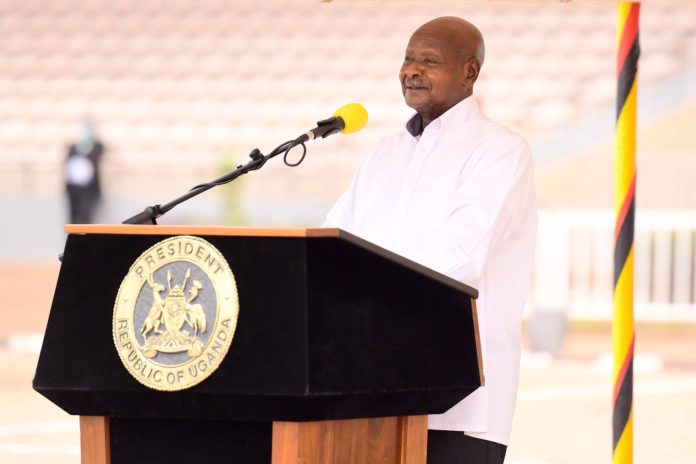KAMPALA, Uganda — The Ugandan government, backed by French and Chinese investors recently announced a final investment decision to kick start the long-delayed development of Uganda’s vast crude oil reserves, opening the way for the East African nation to become an oil exporter. But the planned development of the $10 billion projects, along the shores of Lake Albert, poses new threats in the ecologically sensitive area.
French oil giant TotalEnergies and China National Offshore Oil Corporation say they will start pumping as much as 230,000 barrels-a-day of crude from the region by 2025, which will be shipped for export through a $3.5 billion heated pipeline linking the oil fields along Uganda’s western border with the Democratic Republic of Congo to the Indian Ocean port of Tanga in Tanzania. The 900-mile pipeline will pass through Uganda’s lush green hilly farmlands, vast areas of marshlands, before snaking around Lake Victoria, Africa’s largest freshwater lake.
Fanfare and military parades marked the event to sign the agreements, a firm commitment that the country’s 6.5 billion barrels of crude, discovered more than a decade ago will be commercialized. President Yoweri Museveni and the Vice President of Tanzania Phillip Mpago were among the key figures that witnessed the event.
“It is a masterpiece of a project and will be achieved at low cost and with a low carbon footprint,” said TotalEnergies CEO Patrick Pouyanné, adding that the Ugandan project comes at a time when the world is facing increased demand for fossil fuel.

But local and international campaigners remain concerned about the environmental impact of the new fossil fuel projects and their carbon footprint. In particular, activists are concerned about the pipeline’s potential impact on water resources for millions of people in Tanzania and Uganda, vulnerable ecosystems, and the climate crisis.
Days after the signing, an oil production ship exploded off the Nigerian coast of Escravos, Delta State in what is considered to be the nation’s second major environmental disaster in three months. It’s yet another oil disaster that has resulted in huge amounts of toxic oil being released into the ocean, a stark reminder of the reality of risks involved in fossil fuels production.
Major funders for the pipeline project have also continued to pull out. Four out of five of South Africa’s largest lenders recently confirmed that they will not be involved in the financing of the pipeline project.
According to data from the World Bank, Uganda accounts for only 0.01% of the total global carbon emissions while its per capita CO2 emissions are also low at 0.13 tonnes. But, that is expected to change when oil production starts. Experts say, oil transported by the pipeline will emit at least 33 million tonnes of CO2 every year.
But Ugandan officials sought to allay the fears, pleading to safeguard the environment and social protection in the development of the projects.
“This project comes with a very big responsibility on the work of all stakeholders involved in the management and development of the country’s oil and gas sector,” said Jane N.Mulemwa, Board Chairperson of the state energy regulator Petroleum Authority of Uganda.

Local civil society actors have also expressed concern about the gross rights violations meted on local oil projects host communities that oil companies and government have failed to address. Locals complain of being intimidated and threatened by local authorities to accept the inadequate compensation for their land. In 2019 a group of NGOs filed a lawsuit against Total in France over human rights violations and environmental harm in relation to planned oil exploitation in the heart of a protected natural area in Uganda. The organizations accuse Total of failure to adhere to its duty of vigilance “Total’s social responsibility.” The case is still in court.
“Oil Companies should walk the talk and comply with social and environmental safeguards, and international best practices on the path to first oil in 2025,” said James Muhindo, the coordinator of the civil society coalition on oil and gas.
The preliminary work to set the stage for the construction of these projects has progressed. The environment and social impact assessments, as well as the front-end engineering design studies for the Kingfisher, Tilenga projects, and the pipeline, were successfully concluded. All the land required for these projects has been identified and surveyed. The processes of compensation and relocation of the project-affected persons are ongoing. These had stalled for years, amid a litany of disagreements such as tax disputes, funding challenges, and opposition from climate activists.
“This milestone puts us on the path to first oil in 2025,” Uganda’s Minister of Energy and Mineral Development Ruth Nankabirwa Ssentamu said in a speech adding that close to 160,000 jobs are expected to be created during the project’s development.

